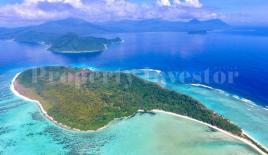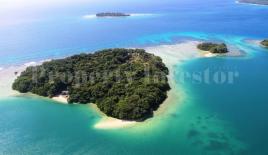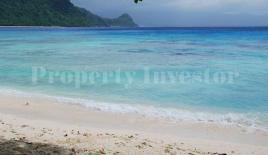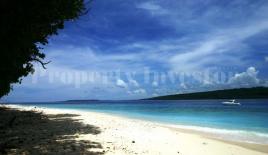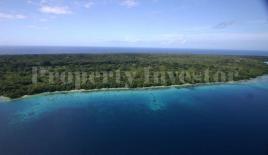
version

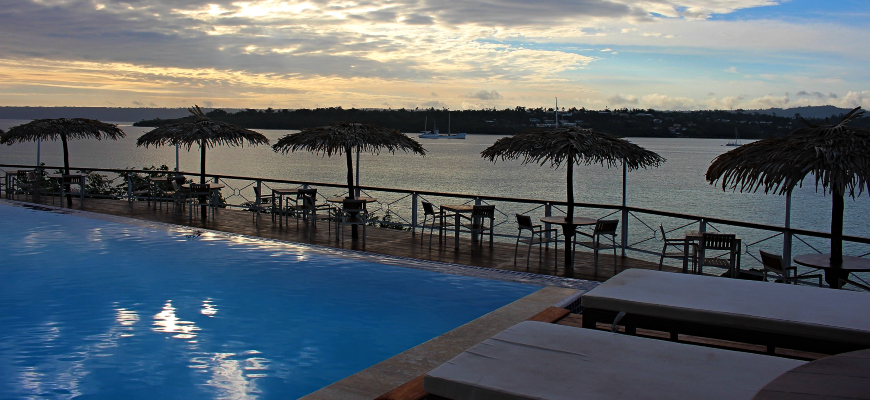
The island nation of Vanuatu is located in the South Pacific archipelago and has maritime borders with the Solomon Islands (to the North), New Caledonia (to the Southwest), Fiji (to the East) and Australia (to the West).
The country occupies 83 islands, of which two-thirds are inhabited. The main ones are Efate (where the capital and main airport of the country are located), Espiritu Santo (the largest island), Malekula and Tanna (with an active volcano). The total length of the territory from North to South is 1300 km.
The islands of the archipelago have a volcanic nature, which has affected their flora and fauna. There you will find mountains, dormant and active volcanoes, underground and underwater caves, rainforests, waterfalls, lakes, pristine beaches and coral reefs along the coasts. There are no large mammals, venomous snakes or spiders. The region is rich in marine life, birds and reptiles.
The islands have a tropical climate with a short rainy season from December to March. The average daily temperature is 20-32C.
| Area | 12 190 sq.km |
| Capital city | Port Vila |
| Population | >300 thousand people, of which more than 98% are Melanesians, the rest are Pacific islanders, Chinese, Australians, New Zealanders and Europeans |
| Language | Bislam language, English, French |
| GDP per person | $3,260 (2019) |
| Currency | Vatu (VUV) |
| Rating in the passport index* | 38 |
* An indicator that ranks countries by the level of freedom of movement, taking into account the rules of the visa regime. The highest positions get passports with visa-free entry to the largest number of countries.
The main airport of the country Bauerfield International Airport can be reached through Australia or New Zealand, where planes fly to many international airlines. Convenient transit flights by airlines:
The national airline Air Vanuatu operates flights from Australia, New Zealand, Fiji, the Solomon Islands and New Caledonia to Vanuatu. In addition, you can fly from Australia to Vanuatu on planes of the Australian airlines Pacific Blue and Qantas Airways, from Fiji - Air Pacific, from the Solomon Islands - Solomon Airlines, from New Caledonia - Air Caledonie.
Since transfers are usually made in Australia or New Zealand, some people may need a transit visa. Especially since the transfer may be delayed.
To cross the border without hindrance, all travelers will need:
If one parent with a minor child goes on a trip to Vanuatu, a couple of documents are added to the package. This is an original or copy of the child's birth certificate, as well as a notarized consent to the child's departure from the parent or guardian. Documents must be translated into English.
Vanuatu has already become popular among foreigners for its tropical forests and beaches, unique underwater world, volcanoes, incredible traditions and unique culture.
Each island of the archipelago has its own characteristics. The oldest sandalwood thickets, pristine beaches, mountains and caves can be found on the Erromango island.
Walk along the slopes of an active Yasur volcano on the island of Tanna. This volcano is the most easily accessible for tourists: its height is 361 meters above the sea level.
More than 30 original tribes, each of which has managed to preserve its way of life and language for several hundred years, can be visited on the island of Malekula. Go to Lelepa island to see the oldest rock paintings in Fels Cave.
For a beach holiday and more choose the Epi island. Here, in addition to bays with white and black volcanic sand, excursions to ancient colonial plantations and rainforests are available.
And on the largest island of the archipelago Esprito Santo there is one of the most beautiful beaches on the planet "White Songs" and the highest point of the island and the country as a whole the Mount Tabwemasana (1,649 meters above sea level). Dozens of ships were shipwrecked and sank in the area of the island. Now it attracts divers from all over the world.
And on Vanuatu, near the island of Efate, the world's only underwater post office is located. After diving to a depth of 5-6 meters, you can send a letter previously placed in a special waterproof envelope.
The islands have six provinces (Malampa, Penama, Sanma, Tafea, Torba, Shefa), more than 15 cities and settlements. The largest and most populous by local standards are the capital city Port Vila and Luganville.
Port Vila is the largest city and capital of Vanuatu. The country's main city is home to government offices, business districts and a bustling commercial port with a modern port district surrounding it.
The capital city has many beautiful historical buildings from colonial times. At the same time, churches and buildings of the Constitution Building, Parliament, Court House and the main post office are no less interesting for tourists. Also, noteworthy are the cultural center, where you can see works of art by local craftsmen and artisans, small cozy villages located on the outskirts of the city, as well as a series of coastal markets.
Port Vila has a well-developed infrastructure. There are meat and fish processing plants, hospitals, shops, banks, public transport, etc. The main international airport of Vanuatu Bowerfield is placed nearby. There is everything you need for a comfortable stay of tourists: hotels, numerous discos, first-class restaurants, casinos, golf courses, souvenir shops, boutiques, duty-free shops…
.jpg)
Luganville, or Santo (as it is called by people from the Northern islands of Vanuatu), is a port town with wide central streets (a legacy of 2nd World War militarization) that house modest municipal offices, law firms, banks, a major hospital, shops and markets. Every year more and more hotels open here. For tourists, there is a golf club, fitness clubs, beauty salons, bars and restaurants all year round. Public transport is provided by taxis and buses. Also, the city is served by the international airport Santo-Pekoa.
Both Port Vila and Luganville have access to 24-hour electricity, central water supply, telephone, Internet, and a wide variety of shops. In other town, these benefits of civilization are limited and may even be absent.
In Port Vila and Luganville, you can stay in apartments, hotels, complexes of dozens of bungalows and usually have three or four stars, less often five. Guest houses are available on small islands.
Public transport like buses and taxis operate on most of the islands of the state, but there is no railway connection. The country also has developed local sea and air transport. So, between the islands located at a short distance from each other, you can move on boats and small vessels. You can reach distant islands on boards the national air carrier. The country's largest ports are in Port Vila, Luganville and Forari.
Mobile communication services on the Islands are provided by TVL and Digicel operators, while Internet access is provided by TVL, Telsat Broadband, Digicel and Wantok. Generally, coverage is good in urban areas, but connectivity gets worse when moving to rural areas.
Primary school education in the country is free and accessible to everyone, with the exception of a few remote tribal areas. Training is conducted in English or French. Lower secondary education is available in several English secondary schools and French mission schools. Complete secondary education at Malapoa English-language College and French lycee in Port Vila.
For higher education, especially medical or technical, locals go to Australia, New Zealand or Fiji. Although in the same capital there are campuses of the University of the South Pacific (University of the South Pacific), which belongs to 12 countries of Oceania, teachers ' College, Agricultural school and Institute of technology.
Medical care in the country is basic and is provided by public hospitals, as well as private medical institutions and small medical centers (mainly in small localities). Their activities are monitored by the Vanuatu Ministry of Health. Significant assistance is provided by the World Health Organization (WHO).
The state gained independence from France and great Britain only in 1980. The change of state structure also led to a change of name. Before that, the country was called the New Hebrides.
Vanuatu is a parliamentary democracy with elections held every four years. And the adopted Constitution established a republican form of government. The legal system on the island is mixed, consisting of English, French and local law.
The island state is a member of many international organizations. Namely, the UN, the WTO, the Commonwealth of Nations, Francophonie, the South Pacific Commission and the Pacific Islands Forum.
The economic basis of the country's life is agriculture, animal husbandry, fishing, tourism and, of course, foreign investment. The government has developed a state tax system to ensure that as much as possible of the latter flows into the country (although 15% of Vanuatu's GDP is already received from international companies). This means that the authorities are interested in creating a favorable legal and business environment for businesses. Bottom line: the country is a dynamically developing offshore zone and a tax haven for many foreign investors.
In particular, international companies (IBCS) registered in Vanuatu are exempt from paying taxes for 20 years. They only pay an annual fee of $300. Corporate and income taxes for businessmen who want to buy a ready-made company on the island are 0%.
There is no tax on income, wealth, inheritance, capital gains and capital outflows for individuals. At the same time, the tax conditions on the island are the same for both local residents and non-residents of the country.
The main currency is cotton wool. Many establishments accept the US, Australian and New Zealand dollars. The current exchange rate of vatu against foreign currencies can be viewed on the website of the National Bank of the country.
Real estate in Vanuatu is usually represented by low-rise buildings such as villas and houses with several apartments. Both new and secondary housing can withstand various natural disasters. Tsunamis, earthquakes, cyclones with heavy rains and gale force winds are not uncommon here.
The average cost of a single apartment in the center of Port Vila is about $150,000. Prices for private homes located near the beaches start from $200,000. Of course, we are talking about high-quality new housing, which is chosen by expats from Australia, New Zealand and other countries.
The monthly rent for an apartment in the capital will vary from $500 to $1,500 depending on the location and the number of bedrooms. The rent for a house by the ocean is between $1,000 and $2,500 a month.
A feature that distinguishes Vanuatu from its neighbors in the region is that this country is the only one that gives citizenship for investment in the State Fund and for a long time. The first offers for investors appeared in the 90s and subsequently changed several times.
In 2015, the government launched the Vanuatu Economic Rrehabilitation Program (VERP) to restore the territories destroyed by cyclone Pam. And in 2017, the VERP program was replaced with two focused on different markets.
The Vanuatu Contribution Program (VCP) has been developed for residents of the Eastern region, which includes China, Taiwan, Macao and Hong Kong. And for citizens of Europe, including Russia, America and Africa, there is the Vanuatu Citizenship Development Support Program (DSP).
As part of the two programs, more than 5 thousand passports have already been issued by the end of 2019. And in the first half of 2019, according to the Vanuatu Treasury, $46 million was invested in the economy.
The programs are constantly being improved, and the reference point is the standards adopted in European citizenship by investment programs. At the moment, the government of Vanuatu plans to review the VCP program, namely, to implement measures to strengthen due diligence. Changes may slightly affect the timing, cost and list of documents at this stage.
Photos: pixabay.com
